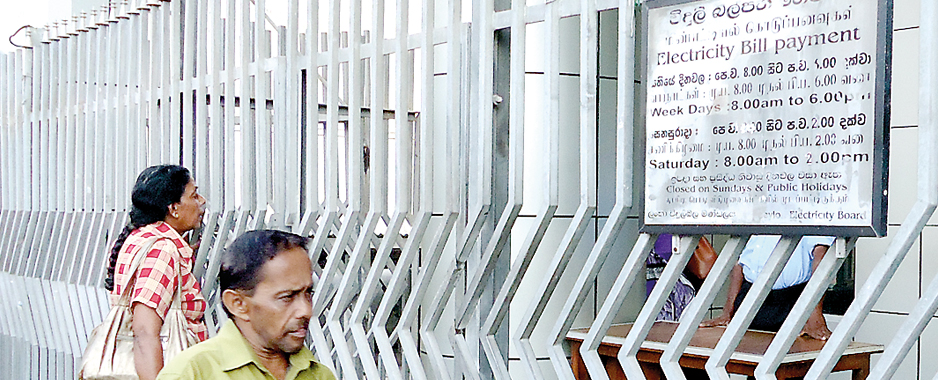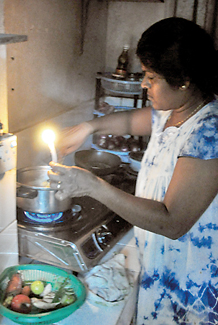News
One power crisis after another
The 300-megawatt (MW) Norochcholai Power Station in Puttalam broke down last week for technical reasons, making this the sixth time the power plant has stalled since the coal power plant started operating last year.
This time the problem was saline deposits on the Norochcholai-Veyangoda transmission line, according to the Ministry of Power and Energy.

Waste of time and bus fare for consumers wanting to pay light bills. Photo: Indika Handuwela
The breakdown forced the Ceylon Electricity Board (CEB) to enforce power cuts of three-and-a-quarter hours per day. The power cuts will continue till August 27. According to the board, electricity usage peaks between 7 pm and 8 pm.
At present, the country’s electricity consumption is around 2000 mw. Total electricity generation capacity is 3300 mw, with a surplus of 1300 mw. The CEB-owned hydropower plants generate 1300 mw, while private sector hydropower plants contribute 200 mw.
“At present, hydropower accounts for only 300 mw of power, with zero input from the private sector,” energy expert Dr. Tilak Siyambalapitiya explained to the Sunday Times. “We have used up what surplus we had. To meet the 7 pm to 8 pm demand, we get 1700 mw from non-hydro sources – fuel and coal, and 300 mw from hydro.”
If the 7 pm power cut is to end, the Electricity Board will have to conserve hydropower and use non-hydro power generation, such as from fuel and coal.
“With the coal power plant non-functioning, we are losing 300 mw, and the Electricity Board is compelled to turn to thermal power, which is costly,” Dr. Siyambalapitiya said, adding that it may take more than three weeks to fix the breakdown. A few technical problems are to be expected in the first six to nine months of the Norochcholai power plant being in operation, he said.
“Power plants become fully operational in the second year, and can be expected to function stably for the next 13 years. A coal power plant can operate 330 days a year, with 35 days for plant maintenance,” Dr. Siyambalapitiya said. “This plant is experiencing serious technical problems. This is an unexpected breakdown.”

Cooking by kuppi laampu. Photo Mangala Weerasekara
The coal power plant is the most cost-effective of the power generators, and should be kept running. “It is tragedy to stall the least expensive plant for so many days. The problem should be thoroughly investigated and the Government should demand an explanation from the Chinese Government, which nominated the contractor to build the plant,” he said.
Monsoon failure and drought conditions have brought down reservoir storage capacity to 18.9 per cent.
Electricity Board vice-chairman Anura Wijeyapala told the Sunday Times that a team of seven engineers from China arrived in the country on Friday to examine the Norochcholai coal power plant. “Turbine malfunction is a cause and needs immediate repair. But we have to give time for the machinery to cool down to begin repairs. It will take at least two weeks to get it fixed,” he said.
According to Mr. Wijeyapala, the Chinese contractor, the Chinese Machinery and Engineering Co-operation (CMEC), has apologised for the inconvenience caused to the country. The company’s vice-president is in the country to oversee the repairs. “Once the Norochcholai plant starts functioning, the power cuts won’t be necessary,” Mr. Wijeyapala said.
The Norochcholai Power Station, also known as the Lak Vijaya Power Station, was built by the China National Machinery Import and Export Corporation (CMEC) with a US$ 450 million loan from China’s EXIM Bank.
This year, the Government had to pay out Rs.168 million to get the plant operating again after a breakdown in January.
At this week’s Cabinet briefing, Media Minister Keheliya Rambukwella said the Norochcholai Power Station was undergoing a trial period, and therefore “no financial losses were incurred.”
CEB strike
Electricity Board trade union action was called off on Thursday, but the public continued to be inconvenienced, with no CEB staff available to attend to their power problems or process their bill payments.
Members of the Ceylon Electricity Board (CEB) Trade Union Alliance, a collective of some 30 unions, launched a strike on August 10. They had 12 demands, the main ones being a total salary increment for non-executive staff, and the settlement of salary anomalies for non-executive staff. The board issued a circular cancelling leave for essential staff.
“Salary increments are given once in three years, and this year it should be 45 per cent, 15 per for each year,” CEB Joint Trade Union Alliance convener Ranjan Jayalal told the Sunday Times. “All the executives were given the 45 per cent, while the non-executives were given only 25 per cent. We are demanding the balance 20 per cent.”
A funeral wreath was placed in front of Mr. Jayalal’s house after the strike was launched.The strike came to a head when the Electricity Board insisted that employees on strike reported to work by 12 noon on Friday (August 17). The Board said the Army would provide security for those who reported to work.
In a statement, the Ministry said strikers had used bicycle chains and sharp-edged objects to damage transformers in Ampara and other areas. Members of the public have been asked to report incidents of damage to CEB property to the nearest Police station or to call the Police hotline 119.
The unions denied they had caused damage to CEB property, saying the transformers and power lines in Ampara were damaged by strong winds.Trade union employees on strike returned to work after discussions with the Commissioner General of Labour Pearl Weerasinghe and CEB officials.
A committee has been appointed to look into the union leaders’ five demands. CEB vice-chairman Anura Wijeyapala promised that salary anomalies would be sorted out by the first week of November.
“During the strike, the CEB asked retired CEB employees and final-year university engineering students who have interned with the Board to act for those on strike,” he said.
comments powered by Disqus
























